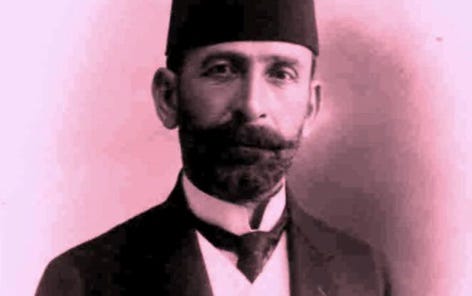On 6 May 1911, the sole Palestinian member of the Ottoman Legislative Council, Said al-Husayni (who hailed from an erudite and important family that would play a large role in the affairs of Palestine and the British Mandate and which traced its origins back to the Prophet Mohammed himself) claimed there that the Jews intend to create a state in the area that will include Palestine, Syria and Iraq. He was alarmed at the rate at which Jews were immigrating into the area described. Palestine was part of the Ottoman Empire until 1918, and Palestinian notables perceived a looming danger in the gradual materialisation of Zionism as a physical, and ultimately a political, movement, even though, by 1918, Zionists made up barely five per cent of Palestine’s population.
However, al-Husayni wasn’t entirely playing his hand according to Hoyle, since he was himself busy at that time selling land to incomer Jews, thus aiding the very looming danger of which he was warning the Turkish parliament.1
It is a not uncommon defence raised on behalf of Jewish settlers at this early time of Ottoman hegemony, followed by British mandate: the land that Jews took into their possession in the early stages of settlement was duly and properly bought and paid for from willing sellers. It’s a story that requires more detailed explanation than that, but it is prima facie a valid argument: land that is sold and bought between freely contracting parties is validly transferred, of that there is no question.
The Jews who came in, mainly from eastern Europe, at that early period of Zionism (the modern roots of which date back to 1882) were viewed somewhat sneeringly, such as by intellectuals in Egypt, as an attempt by Europe to offload its poor, stateless, excess baggage onto the Near East. To that extent, and rightly or wrongly, the influx of Jews into Palestine was being viewed in a similar light to that in which the influx of boat people across the English Channel into Britain has more recently been viewed: offloaded flotsam and jetsam.
Some, such as the Jewish scholar Ilan Pappe, analyse this concern at the arrival of Zionists in the early years of the 20th century as overlooking the ultimate catastrophe that the influx would eventually portend, culminating in the Nakba of 1948 and the alleged genocide of 2023 and 2024.
If one follows this manner of thinking, one sees an immigrant flow being viewed initially with indignation, as an intrusion, but as little more. To begin with, the intrusion is barely perceptible, given the small numbers involved. The assumption is that the incomers will gradually assimilate into the peoples of the great Ottoman Empire. Within a dozen years, the alarm bells are sounding and a realisation dawns that the incomers want more than simple assimilation and integration, thus the analysis:
The more precise strategies of how best to take over Palestine as a whole and create a nation state in the country or in part of it were a later development closely associated with British ideas of how best to solve the conflict Britain itself had done so much to exacerbate.
Ilan Pappe: The Ethnic Cleaning of Palestine, p. 13.
Moving ahead to today, when Lee Anderson, former deputy chairman of the British Conservative party, claims that the Labour mayor of London, Sadiq Khan, is under the control of Islamists and that the beautiful capital city of London has been given to Khan’s “mates”, a pattern can be discerned in Mr Anderson’s line of thought, if not his moral rectitude, let alone his exactitude, supposing he is alluding to events one hundred years ago in Palestine. Just how far the parallel holds water is beyond my ken.
Anderson views Muslim migration to the United Kingdom as a means by which influence and position could gradually be acquired, as a forerunner to some kind of power-grabbing coup led by the mayor of the capital city; one might surmise from Anderson’s claims that he sees this as leading to a take-over of the entire United Kingdom by purported fifth columnists, although quite that far he does not at this stage go. But, having taken the capital, what invading power would not then go on to conquer all of Britain, at that (unless, of course, they happened to be Roman)?
One wonders where Mr Anderson gets these ideas from.
Image: Lee Anderson. CC BY 3.0
It is of course possible that it was precisely as a result of his sales of land that al-Husayni had become aware of the extent to which it was being bought by incomer Jews.





